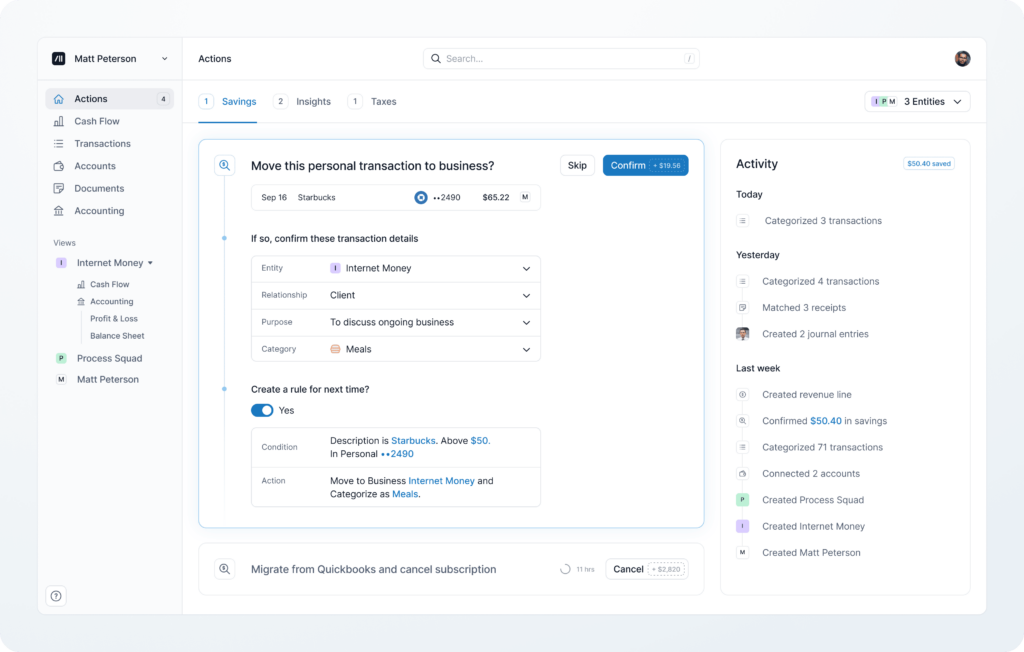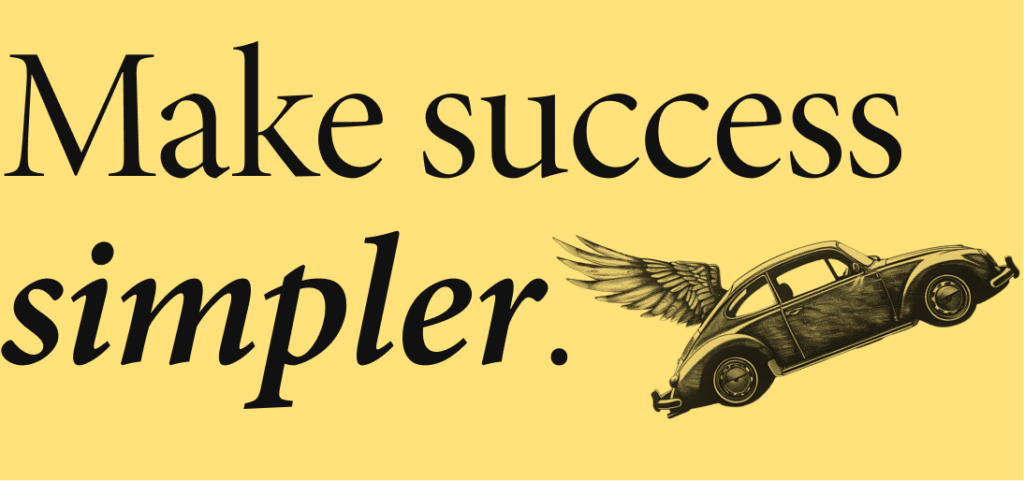Welcome to One Thing Better. Each week, the editor in chief of Entrepreneur magazine (that’s me) shares one way to be happier and more effective at work — and build a career or company you love.
Today’s edition is sponsored by Kick, my favorite bookkeeping software (for real!). See details at the end of the newsletter.
When you relentlessly chase one goal, you struggle.
But when you embrace uncertainty, you achieve.
Why is this?
I have an answer: It’s advice that I got from Malcolm Gladwell — and it will shift how you approach your work.
This is especially important to hear right now, as we enter 2025 — a new year full of hopes, fears, aspirations, and anxieties, where you may have defined ideas about what you want.
But before I share Gladwell’s advice, I want to step back — waaaaaaaay back! — and ask another question: What will 2025 bring?
Because I have a surprising answer to that too, and it sets up Gladwell’s advice perfectly.
It’s a prediction that I found from 100 years ago, which is shockingly accurate… and also hilariously wrong… and makes a mistake that we all need to avoid.
Let’s go back 100 years ago

That’s a photo of Archibald Low. He was born in 1888, and is one of the most accomplished people you’ve never heard of.
Low was a visionary genius — credited with inventing the first drones and television. He was also an unfocused egomaniac who rarely stuck with a project, and annoyed other scientists by calling himself a “professor” despite not being one.
And in 1925, he wrote a book called The Future — predicting our lives in 2025, complete with illustrations. Here, for example, is how he imagined our living rooms:

So much is correct. We do have TVs on our walls, which broadcast live sports. We can control the temperature of our rooms. We listen to music however and whenever we want. We have access to information from around the world (that’s those panels on the right). And our children play with electronic toys. This was all a fantasy for people 100 years ago. To us, it’s commonplace.
But of course, so much is also wrong. See the tube that guy is sucking on, for example? That’s how Low thought we’d eat our meals. The thing in the garage? That’s a flying car. And the guy’s baldness? Low thought all men would be bald in 2025 — the result of wearing hats too much.
Incredible foresight and comical wrongness. That’s how it goes with him. Here are some more of his predictions, as reported in this article from 1925:
- “Signatures to checks may be sent by wireless to the bank while the cashier watches by ‘television.’”
- “Women will at last dress logically in a one-piece hygienic suit, warmed by wireless.”
- “A loud speaker will take the place of a morning paper, giving all the news while a ‘television’ machine will replace the daily pictorial newspapers.”
- “Automatic telephones will be everywhere and will get the right number all the time.”
- “When a businessman goes to the movies, he will see half a dozen films being shown at the same time on the same screen.”
Again — Low’s ideas are directionally correct, even as the specifics are way off. Sure, cashiers don’t watch us submit checks on our banking apps, but an automated system does review it. And movie theaters don’t show six films at once, but he might as well be describing the freneticism of TikTok.
Now, imagine this: Imagine if scientists took Low’s predictions as fact, and then spent the next 100 years working to make them a reality — in exactly the way that he described them. They would ignore all new scientific discoveries that didn’t support his theories. They would dismiss new ideas, even if they were clearly better ones. They would only focus on Low’s vision. No changes. No deviations.
Sounds crazy, right? But this is often what we do to ourselves.
And that’s the problem we need to fix.
How to improve our futures
We can’t control our futures. But we sure do try — to our own detriment.
The 13th century poet Rumi captured this problem beautifully:
“When I run after what I think I want, my days are a furnace of stress and anxiety; if I sit in my own place of patience, what I need flows to me, and without pain. From this I understand that what I want also wants me, is looking for me and attracting me. There is a great secret here for anyone who can grasp it.”
OTB reader Sande Golgart sent me that quote, because it resonated deeply with him. “As I am building my business,” Golgart wrote me, “it can be a struggle between chasing what I think I want and letting things flow to me.”
Consider what’s happening there.
Rumi and Golgart — and all of us! — have an idea of what we want. We predict the things that will make us happy and fulfilled, and then pursue those things with singular focus. That pursuit makes us unhappy. It is a paradox.
Why do we do this?
As I puzzled over this question, I remembered a conversation I had years ago with Malcolm Gladwell. I asked Gladwell about the work he does, and how he chooses projects that are just so distinctively him. How does he define himself, I wondered? What is his filter?
His answer impacted me. He said that, to the best of his ability, he tries not to define himself at all.
“Self-conceptions are powerfully limiting,” he told me.
Then he continued:
“The most important thing is never to make a decision about yourself that limits your options. In the act of defining yourself, you start to close off opportunities for change, and that strikes me as being a very foolish thing to do if you’re not 85 years old.”
For this reason, Gladwell told me, he tries to never define himself — because if he did, he’d overlook every opportunity that doesn’t fit his narrow definition.
Now, in true Gladwellian style, let’s bring all these stories together…
In 1925, Archibald Low had the freedom to get things wrong. The specifics didn’t really matter. But we cannot make the same mistake for ourselves. We cannot anchor ourselves to specifics or predictions. We cannot say: “Only this will make me happy, so that’s all I’ll focus on.” Because we’ll likely be wrong. The future is too unknowable.
The problem is our filter. The problem is our own conviction about what we need.
How to get what we really need
Yes, sure, we can have ideas of what we need. We can have hopes and aspirations. But we must also know: The future is full of opportunities we cannot predict. And we must be open to them.
Our most fulfilling personal relationships may come in ways we weren’t looking for. Our most fulfilling work may happen in arenas we never sought. Being the editor in chief of Entrepreneur magazine changed my life, but frankly, I’d never even heard of the magazine until much later in my career.
When we’re open to the wide world of possibilities, we find the ones that matter most — even if they don’t match our original desires. So maybe, next year, we need to step back a little more. Widen our bands. Embrace that the best things can be the ones we weren’t looking for, and the greatest satisfaction can come from being surprised.
Do not predict the future. Just enter it, open-eyed and open-minded, as if anything could happen. Because anything could.
That’s how to do one thing better.
Happy new year, everyone. I’m so honored you’ve spent time with me this year, and here’s to us all doing even better in 2025.
This bookkeeper saves me so much time!

A few years ago, I signed up for one of the major bookkeeping services. I hated it. So complex! Too many options!
Then I got introduced to Kick — and as soon as they walked me through the platform, I laughed out loud at how simple and easy it was.
True story: I begged them to NOT add more features! It’s so simple, it’s perfect. My books are done automatically and accurately in real-time, my account is optimized for tax savings, and when tax season rolls around, it’s 10x easier than before.
Are you a freelancer? Starting a business? Run multiple businesses? Whatever the case, try out Kick. It takes 5 minutes to set up your accountant, and you’ll be laughing out loud alongside me — knowing that you don’t need to go crazy over accounting anymore.
*sponsored
